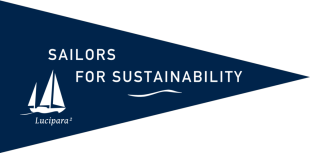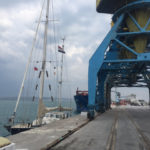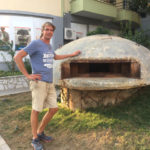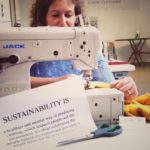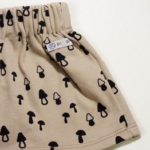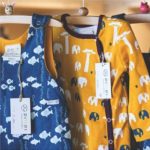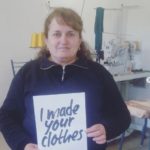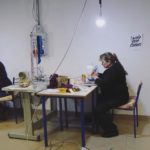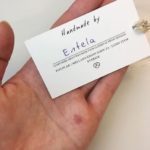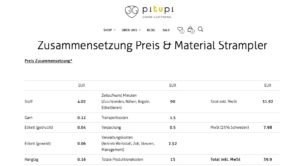People-to-People Clothing (ALB)
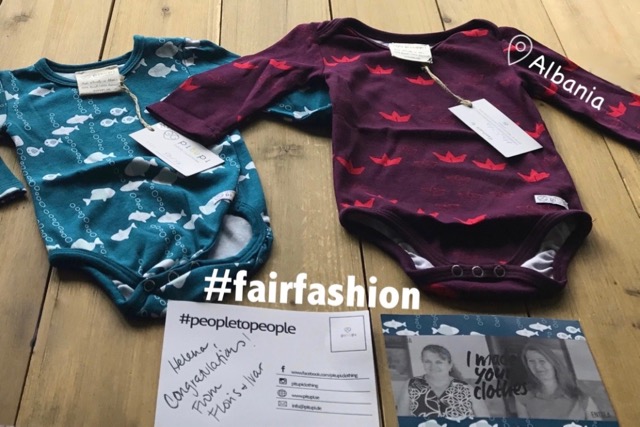
In Albania, we meet Pitupi that makes clothing “people-to-people” and where environmental and social values are as least as important as financial profit.
Contributes to achieving the following UN Sustainable Development Goals:
As soon as the northerly wind abates, we leave the Greek island of Corfu and sail northward along the Albanian coast. As we approach the port of Durrës, Ivar sees warning symbols on our digital chart. Sea mines!? They cover the entire area in front of the port, except for a narrow channel. We read that the mines date from the era of the Cold War and have been cleared a long time ago. Still, we don’t feel at ease. Should we use the channel, despite the long detour?
Local fishing boats help us decide. They are fishing in the former minefield. “I’ve never been so happy to see fishermen”, Ivar sighs. We reach the port without any problems. On the quay between a bulk carrier and a tugboat, just under a gigantic crane, our agent Ilir is waving at us. He has arranged this berth so we can safely leave Luci and travel to the capital Tirana.
Albania is Craving for Change
On land, one-man bunkers adorn the streets. Like the mines on the sea chart they are remnants of Albania’s isolated and schizophrenic past. Floris’s friend Suela explains to us that Albania only recently became free. Since the end of the dictatorship, the country has been changing rapidly. It is introducing new laws at breakneck speed to fulfil its ambition of joining the EU. “An open view towards the rest of the world is now prevalent, but the recent history of state terror and the lack of freedom in Communist times are still in our collective memory”, Suela explains.
As we walk around the city, we see contrasting scenes. Poor street vendors offer ramshackle goods right next to a modern hotel. Luxury cars zoom past derelict houses. The streets are full of litter, except on the city’s restored main square. Not everybody benefits from the increased material prosperity. We wonder: are there entrepreneurs here who look beyond financial gain and address environmental and social issues, too?
Pitupi – People to People
We meet Stela and Jona. They work for Pitupi, a young company that makes children’s clothing based on a remarkable approach. “We want to distinguish ourselves by offering good working conditions and using materials that do not burden the environment”, co-founder Stela explains. “With our clothing, we also aim to create a direct, personal bond between producer and customer. Hence the name pi-tu-pi, which comes from ‘people to people’, Jona adds. Curious to learn more, we ask: “What exactly does that mean in practice?”
Organic Cotton
“In choosing our materials we take nature into account as much as possible. That is why we only use certified organic cotton for fabric”, Stela says. “No agricultural poisons are used in the cultivation of organic cotton. That is better for the soil, the groundwater and also for the people working on the cotton plantations. In addition, our fabrics are colored in an environmentally friendly way, so without aggressive dyes or bleaching agents. That is also healthier for the child’s skin!”, Jona smiles. “When it comes to buying other materials, we look for eco-labels”, Stela adds.
Know Your Seamstress
Pitupi’s approach goes beyond environmental awareness. Social responsibility plays a big part, as becomes evident when Jona talks about Pitupi’s seamstresses: “With our products we want to help people. Our seamstresses come from difficult social conditions. You could say that they have a distance to the labor market. We train them and offer them an opportunity to provide an income for their families. As they work in our own workshop, we can guarantee that the seamstresses enjoy good working conditions and receive fair wages.”
The customer also gets to know the seamstresses a bit. With each delivery comes a card. It shows the photo and name of the seamstress who made the garment. Customers may even send a card back with a message or a child’s drawing to thank the seamstress. “It’s our way of creating a bond between seamstress and customer,” Jona explains.
Transparency via Internet
Doing our research on the fashion industry, we read that some of the problems include unsafe buildings, long working days, low wages, contaminating dying procedures and even child labour. Such conditions exploit workers and harm the environment, all to save costs. We understand that Pitupi is choosing a different path, but wonder how they convince customers that they are different? The internet plays an important role. “We sell through our webshop and are as transparent as possible. On our website, customers can see exactly what the clothes are made of, where the material comes from and what everything costs,” Stela explains. “Transparency of the entire chain is one of Pitupi’s core values. Everyone can see that we deliver what we promise!”
Cheap is Expensive
Pitupi’s clothing is not cheap. “Is your higher price a problem?” we want to know. “We show exactly what each step in the production costs and how the end price comes about. Consumers can see that a product that takes nature and people into account entails higher costs. Our target group is the conscious consumer, who is prepared to pay more for a fairer and better product.” Pitupi sells throughout Europe, so there should be enough conscious consumers to grow the young business.
Back on board we reflect on more expensive clothing. Some clothes are so cheap because damage to the environment and social abuse through worker exploitation are not included in the price. In other words, you don’t pay the ‘true price’. Yet if a piece of clothing is more expensive, it also gets more value. Then you buy less, it often lasts longer and it’s worth repairing. And if it does not fit anymore, it can be handed down to another child.
When a friend of ours gives birth to twins, we know the perfect gift and order a set of colorful Pitupi baby clothes. They are very well received. Our friend is not only enthusiastic about the beautiful items of clothing, but also about the personal card from seamstress Entela. The concept of pi-tu-pi really works!
Trust through Openness
We believe that nobody wants to be consciously complicit in the exploitation of people and nature when buying clothes. Yet buying more expensive clothing is no guarantee that the money ends up in the right place. Through transparency the fashion supply chain becomes less anonymous. This is crucial, as worker exploitation and environmental pollution can take root when they happen out of sight. Therefore, by being open about the entire chain and all costs involved, the trust between producer and consumer can be restored and consumers can make a conscious choice when buying clothes.
Pitupi is therefore a welcome newcomer in an often-reviled fashion industry. It is a good example of a modern Albanian company for which environmental and social values are as least as important as financial profit. Will you help to make Pitupi a success and inspire other garment producers to follow?
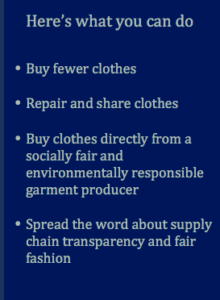
Related Sustainable Solutions

Circular Materials (NZL)
Waste does not exist in nature. Which circular materials can we use instead of plastic, so we can reduce human-produced waste?

Food Recue (NZL)
We meet organisations that lead the way in reducing food waste and learn that all of us have a responsibility to tackle this global challenge.

Fair Fashion (ALB)
In Albania, we meet Pitupi, which makes “people-to-people”clothing. Environmental and social values are as least as important as financial profit.

Local Currency (ITA)
We sail to Sardinia to visit the local currency Sardex. Could this be a more sustainable monetary alternative suitable to support a circular economy?

Mondragon Cooperatives (ESP)
At Mondragon, employees are owners, salaries and profits are fairly distributed, there is solidarity among cooperatives, and education is held in high esteem.
